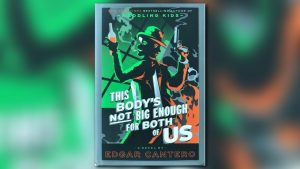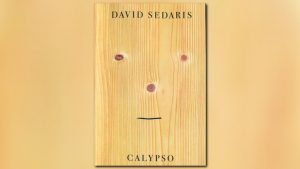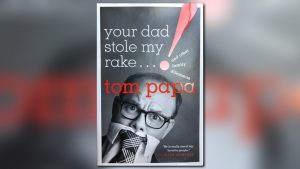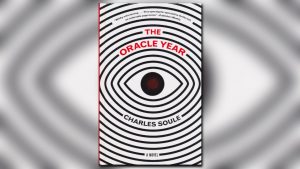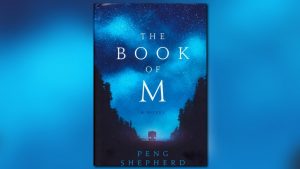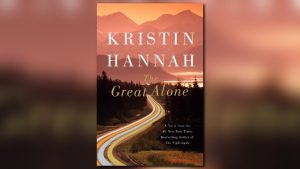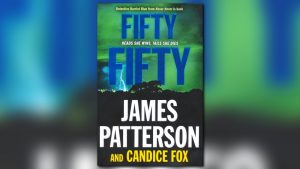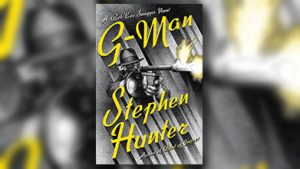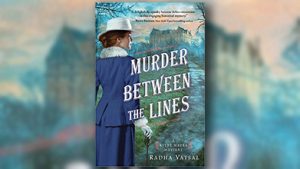“The Absolutely True Diary of a Part-Time Indian” is the story of Junior, a budding cartoonist growing up on the Spokane Indian Reservation.
Determined to take his future into his own hands, Junior leaves his troubled school on the reservation to attend an all-white farm town high school where the only other Indian is the school mascot.
“The Absolutely True Diary of a Part-Time Indian,” which is based on the author’s own experiences, coupled with poignant drawings that reflect the character’s art, chronicles the contemporary adolescence of one Native-American boy as he attempts to break away from the life he thought he was destined to live.
Through a collection of stories, Alexie explores the precarious balance between self-preservation and external responsibility in art, family and the world at large.
In the title story, a famous writer must decide how to care for his distant father who is slowly dying a “natural Indian death” of alcoholism and diabetes, just as he learns that he himself may have a brain tumor.
Alexie also dissects a vintage-clothing store owner’s failing marriage and his subsequent courtship of a married photographer in various airports across the country, what happens when a politician’s son commits an unforgivable hate crime and how a young boy learns his self-worth while writing for the obituary department of his local newspaper.
ALBERTO RIOS: Welcome to Books & Co., I'm Albert Rios, your host, and we're joined today by noted novelist, poet, screen writer, young adult author, comedy performer, journalist, and many more things, Sherman Alexie. Mr. Alexie is the author of The Absolutely True Story of a Part-Time Indian, which won the 2007 national book award, and War Dances, which won the 2010 Penn Faulkner Award for Fiction. Welcome, Sherman.
SHERMAN ALEXIE: Thanks. It's good to be here.
ALBERTO RIOS: I'm so pleased that you're back. Phoenix has a place in your imagination, in your work. I wonder if you could talk about that as we start.
SHERMAN ALEXIE: That's right. Well, the movie Smoke Signals is based on a short story of mine called "This is What it Means to Say Phoenix, Arizona." In 1990, my best friend from the rez and I came down here, his father had moved down here, had divorced his mother and moved down here and died of a heart attack. And so my friend and I came down here to clean up the trailer, to get his father's remains --
ALBERTO RIOS: this sounds like the movie!
SHERMAN ALEXIE: Yeah. So I wrote a story about it -- fiction. And so Phoenix always had this big thing to me. The first time I was ever on an airplane. Unlike the story, and the book, it was on a bus, because buses are more cinematic putting an Indian on an airplane wouldn't have been as cinematic. So, yeah, it wasn't actually Phoenix, it was surprise.
ALBERTO RIOS: Oh, interesting. That's where all the filming took place.
SHERMAN ALEXIE: No, that's where we went, was Surprise, Arizona. And in retrospect, I use the word "Phoenix" because of the imagery, but “This is What it Means to Say Surprise, Arizona,” would have also been interesting. When we were trying to name the movie, because we couldn't use that, it doesn't fit it on a marquee. One of the working titles was "Surprise, Arizona." So, yeah, so it --
ALBERTO RIOS: A little history.
SHERMAN ALEXIE: And it's not the sleepy community it was back then. I was there last summer and I thought, whoa, I thought I might be able to find the trailer park. Because it was so isolate and so distinct, but impossible. There's no way I could.
ALBERTO RIOS: I'm sorry.
SHERMAN ALEXIE: Yeah.
ALBERTO RIOS: Those things are going quickly.
SHERMAN ALEXIE: Yeah. It's revisiting -- I'm an Indian, I'm used to lost things. We're the country's lost and found department.
ALBERTO RIOS: Well, these things that are going quickly, it's great that we can take them to the page and find a different way to keep them. Different way to remember them.
SHERMAN ALEXIE: Yeah. I hope that works. I don't know. It's sort of what you do too. You were the second poet I ever met. You came to Washington State University when I was an undergrad.
ALBERTO RIOS: A long while back.
SHERMAN ALEXIE: And your mustache arrived five minutes before you did.
ALBERTO RIOS: Those days. Things lost.
SHERMAN ALEXIE: I think I have it back on my rez.
ALBERTO RIOS: It may be.
SHERMAN ALEXIE: We have your mustache next to an old war dance outfit. But you came in and your poetry was certainly grounded in place, and in culture, in a way that I hadn't seen as much in other people's work. And then meeting you in person was amazing.
ALBERTO RIOS: You took that to heart. This is what you write about, it's the kinds of things you've covered from your own perspective, which I think is dramatic so often. But quiet as well. And you work between genres. Let me start first with something along those lines. You have worked in just multiple genres, and in film you worked with the moving image, in poetry with the studied image. In narrative with the image juxtaposed with other images. Weaving these together in different ways, but they are separate genres. How do you distinguish them and how do you tell when a poem has presented itself?
SHERMAN ALEXIE: It used to be very simple. The way technology worked, I had a type writer. So if the poem went past one page, it became a short story. And --
ALBERTO RIOS: The true secret of writers.
SHERMAN ALEXIE: And if the short story went beyond five pages, it was a novel. So really it was simply about the technology and the way you get formed. Which is very interesting, because yesterday I did a very informal Facebook interview with a young native woman named CHER, but she asked me about how do I become a writer. And I said in this era, with technology the way it is, I have no clue. I don't have a clue how you begin a career now. But that's what really formed my aesthetic, and it wasn't even my type writer. It was my girlfriend's brother's type writer. That's really what made me in a lot of ways a multi-genre writer. But also -- and I've never seen any academia do a paper about it. That '60s, '70s generation of writers, Simon Ortiz, who is a professor here, were all multi-genre, so when I first started reading Native American literature, my primary influence was multi-genres. So I didn't know it was strange.
ALBERTO RIOS: You think of genres as having borders. If it's moving between those borders, it's an interesting thing. That also happens on the page.
SHERMAN ALEXIE: Yeah. And in the world, I guess in the native world, because art is still so much a part of everyday life, it's not really special. You walk into any fourth grade reservation classroom, and every kid in there is engaged daily in some art form. There's really no separation in the Indian world between the artists and the people.
ALBERTO RIOS: It's a wonderful statement. Art is not special. What a wonderful thing to be able to say, because it is part of something regular and therefore part of our formative sensibilities.
SHERMAN ALEXIE: So no boundaries. In a healthy way, I hope.
ALBERTO RIOS: And not between special -- everybody goes out to music class, or we have that compartmentalization.
SHERMAN ALEXIE: There's also a drum nearby. I guess could you alter that to say there's always a poem nearby. There's always a story nearby.
ALBERTO RIOS: You've done this physically in your work, War Dances, for example, includes both longer narratives and what we might perceive as being poems. You're mixing it up even within the book covers.
SHERMAN ALEXIE: Yeah.
ALBERTO RIOS: How do you think that works?
SHERMAN ALEXIE: Well, that was a very conscious choice, because the two books are right here, but True Diary did so well. That thing went crazy. It's still going crazy. And I sort of reacted against the popular success, the mainstream success, so I decided --
ALBERTO RIOS: Who wants that?
SHERMAN ALEXIE: Yeah. Well, you know, I do. But you still have a relationship with it. And so part of me wanted to reestablish the fact I am a small press out there, that is my aesthetic. There's no logical reason why a rez boy writing rez stories should be a national best seller. There's no logical reason for it. So there's some strange alchemy that occurred. So I wanted to sort of reestablish and restate my independence small press roots.
ALBERTO RIOS: And it suggests voices voice no matter where.
SHERMAN ALEXIE: Yeah.
ALBERTO RIOS: A very nice notion, but to see it in practice is even better.
SHERMAN ALEXIE: My first book was poems of stories, so it was also called back to the beginning of the career. And the book itself is concerned with the past and the old ways of being, particularly in an American context. So there's an ode to mixed tapes in there. There's an ode to pay phones. And a lot of the cultural stuff that's gone. And I don't think anybody really misses pay phones, but I do.
ALBERTO RIOS: As you say, they were like the bus scene; you needed the bus for the vista shots. Pay phones still occur because detectives need to make that quick call.
SHERMAN ALEXIE: Yeah. And so when I see one now, I really notice it. They still have them in the airports. I remember early on in my career, I didn't have a cell phone. I was one of the last people I know to have a cell phone. So when I landed, I would call, I had a calling card. So I would call home to say I'd landed. And there seemed to be more ceremony about it. A lot of important things have become casual. A lot of things taken for granted. Louie C.K.’s a comedian that has that bit about people taking airplanes for granted, and air travel. He says 100 years ago, it took 30 years to get from New York to Los Angeles. And along the way an Indian shot you in the neck. And it was a whole different set of people who arrived than who started. And now you complain because it takes five hours. So I think part of it was a low-key celebration of some of the stuff of the past.
ALBERTO RIOS: I wonder if you're using a very interesting word, I wonder if writing itself has gotten casual on the page. I don't think that's what you're saying about --
SHERMAN ALEXIE: Wow! That's an interesting point. Everybody's writing. There's 10 million blogs out there.
ALBERTO RIOS: There was a very interesting thing when the first -- when the Russian writer came here who got the Nobel Prize, his name is escaping me. We'll make it up.
SHERMAN ALEXIE: UH – Solzhenitsyn.
ALBERTO RIOS: That's the one. He said it's got him -- he said that America -- something to the effect that America never has had and never will have any great writers because you've always been allowed to write.
SHERMAN ALEXIE: Oh.
ALBERTO RIOS: We don't earn the page any longer. And he said it's not to somebody hold as gun to your head and says, "Don't write" that when you do in that dark night, you know there may be consequences. We don't have it. We don't write that way anymore. We write with ease and with freedom, and that casual thing. But not everybody does in the world.
SHERMAN ALEXIE: You know, that's really interesting. I always thought of the inverse of that, that the powerful people in this country figured out a long time ago that the best way to make writers powerless is to just ignore them. Because as soon as you pay attention to a writer and any fears they may present, then they become powerful. Like I love when my books get challenged or banned.
ALBERTO RIOS: I know.
SHERMAN ALEXIE: I love it. That means the book has power in that community. In a very tangible way. So -- I'm sort of boggled by the thought that because writing is so available, it has less and less power. I mean, I always say, you think some young writer who is blogging away is really going to -- when their blog starts say, “Grandma, look at my blog.” Maybe. But is that ever going to have the same power as, “Hey, grandma, look at my book. Look at this.” And so once again, I – people accuse me of being some Luddite old fashioned dude, but I'm just an Indian, naturally suspicious of white guys telling me I should change.
ALBERTO RIOS: And the machinery, the computer lends itself to that ease as well. And no end, no border, do what you want.
SHERMAN ALEXIE: And a very -- this is a change I've been thinking about, and I don't even know what it means. The impulsive thought. My career in literary world is run by women. Editors, agents, book sellers, book store owners, publicists, 99% of the people I work with in publishing are women. But now technology is making it guy’s runt literary world. So how is that going to change who gets the attention? I have my career because of college educated white women. So what happens when they're not in charge anymore? Does an Indian writer ever have this career again? White guys read white guys.
ALBERTO RIOS: There you've said it. Let me remind our viewers, you're watching Books & Co., I'm your host Albert Rios, and we're joined today by Sherman Alexie, who is talking about his books The Absolutely True Story of a Part-Time Indian, and War Dances. You know, the you're raising this issue about genders, how it's working in the publishing world, but you have a book, for example, War Dances, it's all from male perspective.
SHERMAN ALEXIE: Yes.
ALBERTO RIOS: I wonder how that plays in terms of readership or response. Is there --
SHERMAN ALEXIE: I don't have a lot of guy readers. I suspect you don't either.
ALBERTO RIOS: I think you're right.
SHERMAN ALEXIE: Yeah. I mean, I see that in my audiences. When I go to book stores. I come to Arizona; I have Indians and white women. That could be the title of my autobiography. It's -- I think for white women it's the combination of things that they have the difficulties of gender, the political social problems, the oppression, they say the bias is because they're women, so they have that knowledge and they carry that around. But they're also white. So they also have some privilege and power because of their race. So I think that combination makes them group most willing to cross borders and boundaries, to read, to be, to live. And --
ALBERTO RIOS: That's an interesting association. You're saying you also would have Indians in an audience, that would make sense. But this is a complexity that is a little bit difficult to gauge, but not difficult to explain.
SHERMAN ALEXIE: Yeah. I know why it's happening. And all along my career --
ALBERTO RIOS: Not to say you don't have male readers.
SHERMAN ALEXIE: No, I do, but I --
ALBERTO RIOS: I read you.
SHERMAN ALEXIE: The vast majority are women. And white women in particular.
ALBERTO RIOS: Interesting.
SHERMAN ALEXIE: I remember -- I made this point before, some guy on the internet freaked about it. And he said, I don't write for -- that's not my audience. And he mentioned Chuck Palahniuk, and I started laughing. He has no idea Chuck's editors, agents, publicists, and the people who sell his books are white women. Yeah.
ALBERTO RIOS: I was lucky enough to see you recently in La Conner at the Skagit River Poetry Festival, and you did something that threw me a little bit, I had been reading about this, but you were billed as doing stand-up comedy. Now, it's the oral tradition, no question where that comes out of, but to do it in the bittersweet way that you do, drawing -- and then to be able to say simple things in -- to an audience who is there to listen to them, but they're not simple things. You say them simply this, bittersweet approach has got to take a toll on family, on those around you, and in your case, on the audience as well. Right?
SHERMAN ALEXIE: I'm used to offending people. It happens all the time. I don't necessarily mean to, but I know it's going to happen.
ALBERTO RIOS: By offend, that's an interesting word all by itself. You're just saying it's not how you think it is. Or how you have done this is not the way I perceived it's the best way to do it.
SHERMAN ALEXIE: People's ideas about the world, in particular challenging people's ideas about Indian, but challenging Indian ideas about Indians. There's just as much an orthodox thinking in the Indian world as there is from non-Indians. So I guess it's -- in the political world, the cultural world, I see a lot of our vision focused outward -- into the so-called colonialists. But I isn't directed inward very much. So in doing so, you get into trouble.
ALBERTO RIOS: But you say you speak truths that are new to the world. That is to say, the colonial world, and so it's an education for outsiders, but it sounds like an education for insiders, or at least provocative fun.
SHERMAN ALEXIE: Yeah, there's all that political cultural stuff, but stand-up comedy is very poetic. Imagery, and what is more poetic than the strategic pause? Timing, as they say.
ALBERTO RIOS: We don't make that association between poetry and comedy in terms of things like timing, but it's just what you're saying.
SHERMAN ALEXIE: Exactly. And so a good punch line is a line break. And people don't think of it that way. It happens all the time. People get mad because I didn't read from my book. I think really, is that really -- have you been so indoctrinated into the idea of sitting in a chair, listening to some jerk-off writer reading from his book, and the thing is, maybe -- I know some writers who love their books, but I always want it to be better and different, and --
ALBERTO RIOS: the page is one thing, but the human being has got a dimension. I that I book --
SHERMAN ALEXIE: you've already read the book, why do you want know read the book? If you want to meet the writer, this is who I am. And so -- and also keeps me excited when I don't know what I'm going to be talking about. That keeps me alive.
ALBERTO RIOS: And I'm sure you've had this experience, somebody questioning something in the book tells you oh, man, I got it wrong, or I didn't do enough! So the vitality of the book is still in evidence.
SHERMAN ALEXIE: The impulse.
ALBERTO RIOS: Right.
SHERMAN ALEXIE: The original impulse comes alive. And you know, it's figuring -- in college, when I was meeting all those writers, and I ended up working for the literary series at Washington State, I was meeting all these writers, great people and great writers, but some would come in so jaded.
ALBERTO RIOS: Already.
SHERMAN ALEXIE: Already. And they would arrive bored. And their performances would be distant, and it felt – they were treating their art like a complete job.
ALBERTO RIOS: Could you recognize this?
SHERMAN ALEXIE: Oh, yeah. The differences between people…the writers who came in excited, and new stuff, and took chances. And took chances on stage. As opposed to, you know, it was essentially a battle of the extroverts versus the introverts, but people who seemed -- some of the writers who came in felt like I felt when I was going to work at the doughnut factory. And so by performing and by keeping it alive like that, I feel like I'm not going to let my work become just work. That it's also to show my passion for it.
ALBERTO RIOS: Some of your life goes into that.
SHERMAN ALEXIE: Yeah. I bleed for this stuff.
ALBERTO RIOS: And again, the lives of the people around you go into it. So it's community, it's taking care of something. You have the artist's intent, and that singularity, but you're taking care after group even if you're provoking them.
SHERMAN ALEXIE: That's the thing. It's one of the reasons why I hate being taped in a performance. Because that makes it universal. It makes it everywhere. When I go into each performance, sometimes -- it's not to say I don't get exhausted or I don't give as much as I should, but I go in with the idea that this is a singular event. This is about me and the audience in the room. The energy we create here. And it's not for copyright reasons; I just don't like it because I don't think the energy comes out. And I've seen it where it's funny, where I look at the performance of me on tape and I don't think it's as good. I really don't.
ALBERTO RIOS: You can --
SHERMAN ALEXIE: And people have asked me to -- TV networks have asked me to tape my stuff. And I just don't think it would work. I think it would flop. I don't feel the same energy when I watch it on TV, watching as I do in the room.
ALBERTO RIOS: That makes sense. Let me -- maybe we can start wrapping this up by talking about a kind of high seriousness that you also bring to the work, even with all the comedy and those things, you talk about issues like alcoholism, and diabetes, which are -- they have a lot of meaning in your life, a lot of people who have been affected in this way. Do you want to talk a little bit about how do you approach that? How do you think about it?
SHERMAN ALEXIE: One of my favorite quotes, "Comedy is just a funny way of being serious," which is great. The native world, we're still in an epidemic of third world poverty, third world disease, third world life expectancy, third world suicide, third world violence. And anybody who says otherwise is lying. And so these are real problems we face every day. And I have a great career and a great life, but all around me is death and destruction. Self-destruction and others causing the destruction. And I would be utterly irresponsible not to write about it. Not to deal with it. And the thing is, the letters I get from everybody, Indian and non-Indian, the idea people focus on most is poor fathers, bad fathers. That seems to be the most universal thing that I write
about. That everybody responds to. And so if that's true, then there's something in the universe that requires me to be writing this stuff. So that all these people can connect to it and help them deal with their own lives. Last night on the humanities lecture, we were trying to figure out what humanities is, and Neil, the dean said something interesting, he said
“Humanities teaches us how to live.”
ALBERTO RIOS: Neil Lester.
SHERMAN ALEXIE: And in some fashion we're also looking at how to die. I suppose --
ALBERTO RIOS: Yeah. That's the Indian version. And you write a lot about your own father in that regard, not that he was characterized that way necessarily, but that impact is central, and it's interesting that's what you hear back.
SHERMAN ALEXIE: You know, my father was a good man who wasn't a very good father.
ALBERTO RIOS: Well said. And I think you can probably be glad of the best part of that.
SHERMAN ALEXIE: Yeah. And deal with the --
ALBERTO RIOS: And write about --
SHERMAN ALEXIE: Artistically deal with what wasn't there.
ALBERTO RIOS: You have the line somewhere about the traditional Indian death. Do you remember what you said? Alcoholism and diabetes --
SHERMAN ALEXIE: Natural causes.
ALBERTO RIOS: Which I laughed at, and it occurred to me, well, berating people is probably not the most effective thing. Making them laugh at their own foibles has got a traditional historical efficacy that you're working with.
SHERMAN ALEXIE: The two funniest groups of people I've ever been around are Jewish folks and Native American.
ALBERTO RIOS: OK, there's a combination.
SHERMAN ALEXIE: Something about the inherent humor of genocide.
ALBERTO RIOS: Can we laugh?
SHERMAN ALEXIE: I don't know!
ALBERTO RIOS: But we know what you mean. The gravitas of a statement like that, laughter or not, laughter is what we do when we don't know what else to do. In so many ways. And so it's telling us we don't have the answers, so if we don't laugh, we're not going to explore anything new. So I'm laughing at that, I'm sorry I'm laughing at it in a weird way, but only after the moment.
SHERMAN ALEXIE: American comedy is Jewish. So -- it is. It is. When you look at the roots of comedy and the United States, it's vaudeville, Milton Berle, the early days of Hollywood, and it is very Jewish. So when I'm being funny, when any American is being funny, they're being Jewish.
ALBERTO RIOS: That's a very interesting observation. Well, I thank you for visiting with us today. We've been talking today with Sherman Alexie, about his books The Absolutely True Story of a Part-Time Indian, and War Dances. I'm Albert Rios. For Books & Co. Thank you for joining us today. And we hope to see you again very soon with another good book.








